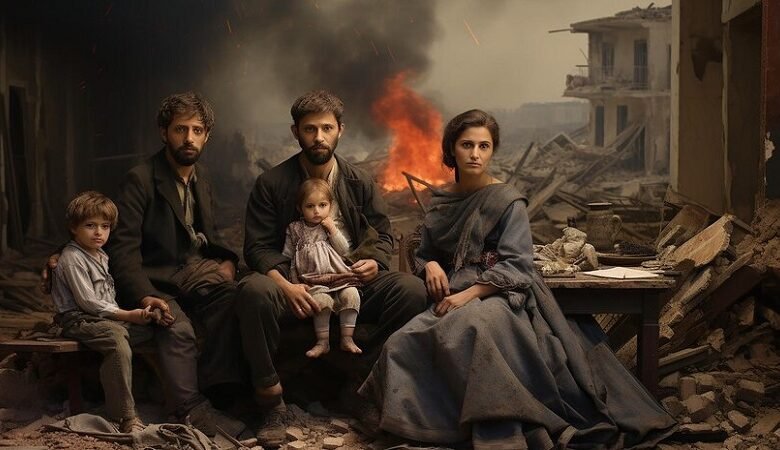How Do The Montague And Capulet Families Contribute To The Catastrophe In Romeo And Juliet? Exploring Their Roles

The Montague and Capulet families play a huge role in the tragedy of Romeo and Juliet. Their ongoing feud sets the stage for the catastrophic events that unfold.
Shakespeare’s “Romeo and Juliet” is more than just a tale of two young lovers. It’s a complex story where family dynamics fuel the drama. The Montagues and Capulets, two prominent families in Verona, are locked in a bitter rivalry. This animosity affects everyone around them and creates a world of tension and conflict.
This feud makes it impossible for Romeo and Juliet to openly love each other. Their secret love leads to misunderstandings, rash decisions, and ultimately, a tragic end. Understanding how these families contribute to the catastrophe provides deeper insight into this timeless play.
The Feud’s Origins
The tragic tale of Romeo and Juliet is deeply rooted in the bitter feud between the Montague and Capulet families. Understanding the origins of this feud gives crucial insight into the play’s catastrophic events. The long-standing hostility between these two noble houses sets the stage for the young lovers’ tragic fate.
Historical Background
The feud between the Montagues and Capulets spans generations. Their animosity is steeped in a history of conflict and rivalry. Shakespeare does not specify the original cause of their enmity. This vagueness suggests the hatred has lost its original meaning and is now a matter of family pride.
Both families are influential and wealthy. They have significant power in Verona. Their rivalry affects not just their immediate kin but also the entire city. The citizens of Verona are often caught in the crossfire of their disputes.
Impact On Verona
The feud’s impact on Verona is profound. It disrupts the city’s peace and order. Frequent brawls between the Montagues and Capulets disturb public life. The Prince of Verona, exasperated by the constant fighting, issues stern warnings and decrees.
The influence of the Montagues and Capulets extends beyond their households. Their servants and followers also engage in violent skirmishes. This widespread animosity creates a tense environment where conflict is always simmering.
The social and political fabric of Verona is strained by the ongoing feud. Efforts to reconcile the two families are futile. Their deep-seated hatred overshadows any attempts at peace. The constant tension contributes to the tragic events in the play, demonstrating how the families’ feud poisons everything around them.
Montague Family Dynamics
The Montague family plays a significant role in the tragedy of Romeo and Juliet. The dynamics within the family influence Romeo’s actions and decisions. Understanding the key members of the family provides insight into how their behavior contributes to the catastrophe.
Lord Montague’s Influence
Lord Montague is the head of the Montague family. He holds a deep-seated grudge against the Capulets. His animosity towards them fuels the ongoing feud between the two families. This feud creates a hostile environment for Romeo and Juliet’s love to blossom.
Lord Montague’s actions often reflect his pride and stubbornness. He rarely considers the consequences of the feud on his son, Romeo. His influence over the family instills a sense of loyalty and rivalry, leading to impulsive and dangerous decisions.
Lady Montague’s Concerns
Lady Montague, unlike her husband, shows concern for Romeo’s well-being. She worries about his emotional state and the impact of the feud on his life. Her nurturing nature contrasts with the aggressive stance of Lord Montague.
Despite her worries, Lady Montague struggles to protect Romeo from the feud’s dangers. Her limited influence in family decisions leaves Romeo vulnerable to the feud’s consequences. Her maternal instincts highlight the family’s internal conflict and its effect on Romeo.
Capulet Family Dynamics
The Capulet family plays a crucial role in the tragedy of Romeo and Juliet. Their internal dynamics, driven by power and ambition, contribute significantly to the unfolding catastrophe. Understanding the individual motivations and actions within the Capulet family helps us see why the tragic events occur.
Lord Capulet’s Authority
Lord Capulet holds considerable authority within his household. He makes important decisions, often without consulting others. His temperamental nature and insistence on obedience create tension. For example, he decides Juliet must marry Paris, ignoring her feelings. This decision pushes Juliet towards desperate actions.
Lord Capulet’s authority is evident during the ball scene. He insists on maintaining peace, yet his strict control over Juliet’s choices highlights his domineering character. These actions contribute to the tragic sequence of events.
Lady Capulet’s Ambitions
Lady Capulet’s ambitions for Juliet also play a role in the tragedy. She desires a prestigious marriage for her daughter. Lady Capulet supports Paris’s proposal, pushing Juliet towards an unwanted union. Her focus on social status blinds her to Juliet’s true feelings.
Lady Capulet’s lack of empathy and understanding exacerbates the situation. Her ambition and desire for social advancement prevent her from seeing the brewing conflict within her family. This lack of insight contributes to the ultimate catastrophe.

Credit: viralmagazineworld.com
Tybalt’s Role
Tybalt’s aggressive nature fuels the feud between the Montagues and Capulets. His hostility intensifies conflicts, leading to tragic events.
Aggression And Pride
Tybalt’s aggression and pride fuel the feud between the Montagues and Capulets.
His hot temper and arrogance escalate the conflict to tragic consequences.
Impact On The Feud
Tybalt’s actions intensify the hatred between the two families.
His relentless pursuit of vengeance blinds him to reason and peace.
Benvolio’s Role
In William Shakespeare’s “Romeo and Juliet,” Benvolio plays a crucial role in the unfolding tragedy. As a member of the Montague family, he acts as a stabilizing force. His actions and decisions significantly impact the narrative. Let’s delve into how Benvolio’s character shapes the story.
Peacemaker
Benvolio consistently seeks to maintain peace between the feuding families. He intervenes in conflicts to prevent violence. In the opening scene, he tries to stop a fight between the servants of the Montagues and Capulets. His efforts show his commitment to peace.
Despite his good intentions, his attempts often fail. The deep-rooted hatred between the families overshadows his peacemaking efforts. This ongoing conflict ultimately leads to the tragic end of Romeo and Juliet.
Loyalty To Romeo
Benvolio’s loyalty to Romeo is unwavering. He supports Romeo through his emotional struggles. When Romeo is heartbroken over Rosaline, Benvolio encourages him to move on. He suggests they attend the Capulet’s feast, where Romeo meets Juliet.
His advice, though well-meaning, sets off a chain of events. Romeo’s encounter with Juliet sparks their ill-fated romance. Despite his loyal intentions, Benvolio’s actions inadvertently contribute to the catastrophe.

Credit: glowmagazine.co.uk
Parental Influence On Romeo And Juliet
The tragedy of Romeo and Juliet stems not only from their love but also from the influence of their parents. The Montague and Capulet families impose strict expectations and control over their children. These actions play a significant role in the catastrophic events of the play.
Restrictive Expectations
The Montagues and Capulets have high expectations for their children. They want them to uphold family honor and obey their rules. These expectations create a suffocating environment for Romeo and Juliet.
- Family Honor: Both families prioritize their reputation over their children’s happiness.
- Obedience: Parents expect complete compliance with their wishes.
- Arranged Marriages: Juliet faces pressure to marry Paris, ignoring her love for Romeo.
These restrictions force Romeo and Juliet into secrecy. They feel they cannot openly express their love.
Desire For Independence
The restrictive environment fuels Romeo and Juliet’s desire for independence. They seek freedom from their parents’ control.
- Secret Meetings: The lovers meet in secret to avoid family interference.
- Defiance: Juliet defies her parents by refusing to marry Paris.
- Elopement: The couple plans to escape their families and live together.
Their quest for independence leads to impulsive decisions. These decisions ultimately contribute to their tragic fate.
| Parental Influence | Effect on Romeo and Juliet |
|---|---|
| Restrictive Expectations | Secrecy and Pressure |
| Desire for Independence | Impulsive Actions |
The Role Of Secret Marriages
The secret marriage between Romeo and Juliet intensifies the feud between the Montague and Capulet families, leading to the tragic outcome. Their forbidden love triggers a series of events that ultimately contribute to the catastrophe in Shakespeare’s timeless play.
The clandestine union of Romeo and Juliet significantly drives the tragedy.Friar Lawrence’s Plan
Friar Lawrence orchestrates the secret marriage to unite the feuding families.Consequences Of Secrecy
The hidden marriage leads to misunderstandings, conflict, and ultimately, the tragic demise.The Tragic Conclusion
The Montague and Capulet families fuel the tragedy in Romeo and Juliet with their ongoing feud. Their hatred creates a toxic environment, leading to the lovers’ doomed fate.
Death Of Romeo And Juliet
In the tragic conclusion of Romeo and Juliet, the death of the young lovers is a result of the long-standing feud between the Montague and Capulet families.
Romeo and Juliet’s secret marriage leads to a series of unfortunate events, ultimately leading to their untimely demise.
Reconciliation Of Families
At the end of the play, the deaths of Romeo and Juliet serve as a catalyst for the reconciliation between the Montague and Capulet families.
This tragic loss forces the families to confront the consequences of their feud and come together in mutual grief, putting an end to the cycle of violence.
Credit: www.gauthmath.com
Frequently Asked Questions
How Do The Montagues Contribute To The Tragedy?
The Montagues’ ongoing feud with the Capulets intensifies tensions. Their actions and decisions, particularly Romeo’s involvement, escalate conflicts leading to the tragic end.
Why Do The Capulets Oppose Juliet’s Love For Romeo?
The Capulets oppose Juliet’s love for Romeo due to the family feud. They arrange a marriage with Paris, increasing Juliet’s desperation.
What Role Does Family Loyalty Play In Romeo And Juliet?
Family loyalty forces Romeo and Juliet to hide their relationship. Their secret love and the pressure to remain loyal lead to tragic decisions.
How Does The Feud Impact Romeo And Juliet’s Fate?
The feud creates an environment of hostility and secrecy. This atmosphere prevents open communication, leading to misunderstandings and ultimately, their tragic demise.
Conclusion
The Montagues and Capulets fuel the tragedy in Romeo and Juliet. Their feud creates tension. This makes it hard for the lovers. Misunderstandings and secrets lead to disaster. Their stubbornness blinds them. They ignore the pain they cause. The families’ actions contribute to the tragic end.
Love and peace could have saved them. Instead, they chose conflict. This story shows the danger of hate. It reminds us to seek harmony.



